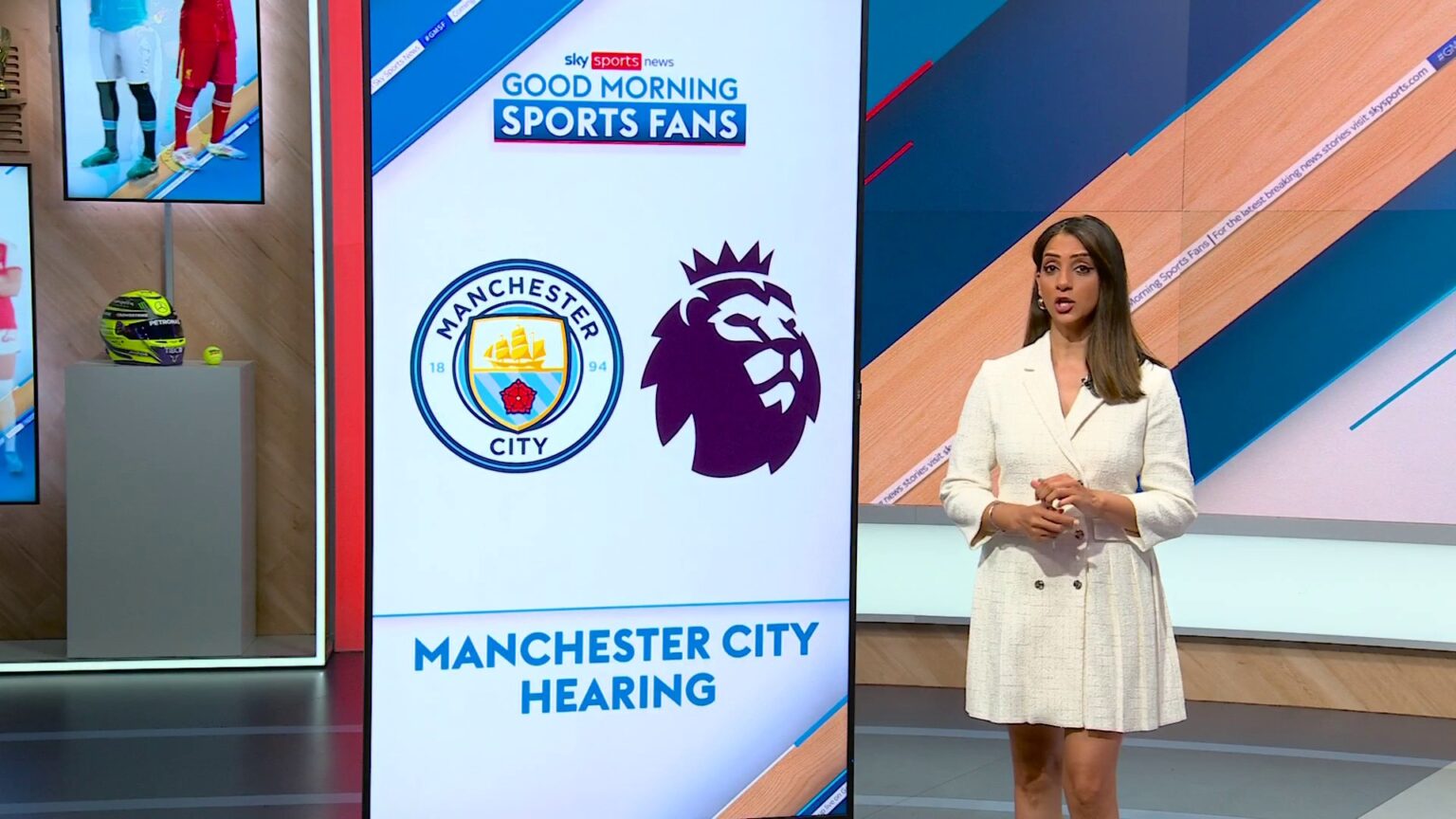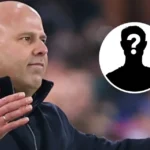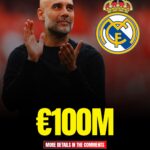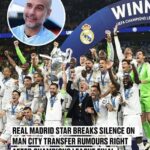Man City ‘in talks’ to sign ‘superstar’ forward before Liverpool, Arsenal

The summer transfer window has erupted into one of the most compelling sagas in recent memory, with Manchester City positioning themselves at the forefront of a fierce multi-club battle for Real Madrid’s Brazilian sensation Rodrygo. As Arsenal and Liverpool circle with equal determination, the pursuit of the 24-year-old winger has evolved into a captivating narrative that encapsulates the complex dynamics of modern football economics, tactical evolution, and elite player movement.
The Brazilian Phenomenon
Rodrygo Goes de Oliveira, universally known as Rodrygo, embodies the quintessential modern footballer – a product of football’s increasingly globalized talent pool whose potential departure from the Santiago Bernabéu would represent far more than a simple transfer. His exit would constitute a seismic shift in the balance of power across Europe’s elite competitions, with Manchester City viewing his acquisition as another definitive statement of intent in their relentless pursuit of football excellence under Pep Guardiola’s meticulous guidance.
The Brazilian’s journey to this pivotal moment reflects the harsh realities of contemporary football’s star-driven ecosystem. Despite his impressive contributions – 68 goals across all competitions for Real Madrid and a Champions League winner’s medal to his name – Rodrygo finds himself in the uncomfortable position of being surplus to requirements at the club he has called home for several years.
The Mbappé Effect: A Catalyst for Change
The origins of Rodrygo’s current predicament can be traced directly to Real Madrid’s successful pursuit of Kylian Mbappé during the previous transfer window. The French superstar’s highly anticipated arrival at the Bernabéu created a domino effect that fundamentally restructured the club’s attacking hierarchy, leaving several established players questioning their futures.
Rodrygo, who had successfully carved out a crucial role within Carlo Ancelotti’s tactical framework, suddenly discovered himself relegated to a more peripheral position. The Brazilian’s frustration became increasingly evident as the season progressed, despite his impressive statistical output of 14 goals and 11 assists across 54 appearances in all competitions. These numbers, while impressive on paper, masked the underlying reality of his diminished status within the squad’s pecking order.
The most significant blow came through the loss of his preferred position on the left flank, where Vinicius Junior and Mbappé formed an almost impenetrable attacking partnership. This situation exemplifies the brutal realities of modern football’s star system, where even players of Rodrygo’s undeniable caliber can find themselves marginalized when clubs pursue marquee signings. His predicament serves as a stark reminder of the delicate balance between individual ambition and collective success in elite football.
Xabi Alonso’s Strategic Revolution
The appointment of Xabi Alonso as Real Madrid’s new head coach introduced another crucial variable into Rodrygo’s future calculations. The former Liverpool and Real Madrid midfielder, arriving fresh from his remarkable success with Bayer Leverkusen, was immediately tasked with evaluating the squad’s composition and identifying areas for tactical and personnel improvement.
Alonso’s assessment of Rodrygo during the Club World Cup became a pivotal factor in determining the player’s fate at the club. The Brazilian’s limited involvement in the tournament – starting just one of three matches – sent a clear signal about his standing in the new manager’s plans. The Club World Cup, originally intended as a showcase of Madrid’s global ambitions, instead became a platform for Alonso to make difficult decisions about squad composition and future direction.
The manager’s tactical philosophy, which emphasizes positional flexibility and technical excellence, initially appeared compatible with Rodrygo’s diverse skill set. However, his subsequent decision to authorize the player’s sale marked a watershed moment in the saga. This authorization not only freed Rodrygo to explore opportunities elsewhere but also provided Alonso with additional financial resources to reshape the squad according to his specific vision.
Manchester City’s Strategic Masterplan
Pep Guardiola’s interest in Rodrygo transcends mere opportunistic recruitment; it represents a carefully calculated strategic decision that aligns perfectly with City’s established footballing philosophy. The Catalan coach has consistently demonstrated his preference for players who combine technical excellence with tactical intelligence, and Rodrygo’s profile fits seamlessly within City’s sophisticated framework.
The reported talks between City and Rodrygo’s representatives suggest that the club views him as a priority target for their summer recruitment drive. This interest has been intensified by the need to replace Jack Grealish, who has fallen out of favor and was notably excluded from City’s Club World Cup squad. The English winger’s £40 million price tag indicates City’s willingness to facilitate his departure, creating both financial and tactical space for Rodrygo’s potential arrival.
Guardiola’s tactical evolution at City has consistently emphasized the importance of wide players who can contribute significantly in terms of both creativity and goalscoring. Rodrygo’s impressive record of 68 goals for Real Madrid demonstrates his ability to provide the latter, while his technical skills and positional awareness suggest he could excel in City’s possession-based system. The Brazilian’s extensive Champions League experience would also prove invaluable as City continues their relentless pursuit of European glory.
The potential signing would represent another piece in Guardiola’s tactical puzzle, providing the squad with additional depth and versatility in attacking positions. Rodrygo’s ability to operate across multiple positions in the attacking third makes him an ideal candidate for Guardiola’s fluid tactical system, where positional interchange and tactical flexibility are paramount.
Arsenal’s Ambitious Pursuit
Arsenal’s determined interest in Rodrygo represents Mikel Arteta’s clear ambition to elevate the club back to the pinnacle of English and European football. The Gunners have been most heavily linked with the Brazilian, with multiple reports suggesting that a move to the Emirates Stadium represents his preferred destination. This preference, if accurate, could prove decisive in determining the outcome of this multi-club transfer saga.
Arteta’s tactical system at Arsenal has undergone remarkable evolution, with the team’s fluid attacking patterns creating numerous opportunities for creative players to flourish. Rodrygo’s skill set would complement Arsenal’s existing attacking options perfectly, providing the pace and directness that could unlock stubborn defenses. His proven ability to contribute both goals and assists would address one of Arsenal’s key areas for improvement as they seek to compete with Manchester City for the Premier League title.
The potential connection between Rodrygo and Gabriel Martinelli has added another intriguing layer to Arsenal’s pursuit. Reports suggest that selling the young Brazilian could fund the move for his compatriot, creating a fascinating dynamic within the club’s transfer strategy. However, Arsenal’s reluctance to part with Martinelli has created uncertainty around both potential transfers, highlighting the delicate balance between squad improvement and maintaining existing talent.
Arsenal’s recent return to Champions League football has significantly improved their financial position and global appeal, making them a more attractive destination for elite players. The club’s commitment to competing at the highest level, combined with Arteta’s tactical acumen and the potential for regular first-team football, could prove decisive factors in convincing Rodrygo to choose North London as his next destination.
Liverpool’s Calculated Interest
Liverpool’s entry into the race for Rodrygo’s signature reflects the new management’s determination to maintain the club’s competitive edge following recent transitions. The potential departure of Luis Díaz to Barcelona has created a vacancy in Liverpool’s attacking ranks, and Rodrygo represents an ideal replacement with his pace, technical ability, and proven goal-scoring record.
The Merseyside club’s interest also demonstrates their commitment to competing at the highest level despite recent departures and squad transitions. Rodrygo’s Champions League experience and proven ability to perform on the biggest stages would provide Liverpool with the quality needed to challenge for major honors. His versatility across multiple attacking positions would also give the new manager tactical flexibility in different match situations.
Liverpool’s historical success in developing South American talent could prove attractive to Rodrygo. The club’s impressive track record with players like Roberto Firmino and Luis Díaz suggests that Brazilian attackers can thrive in their high-intensity system. The potential for regular first-team football at Anfield might also appeal to a player seeking to reestablish himself as a key contributor rather than a squad option.
The Financial Landscape
The €90 million price tag attached to Rodrygo reflects both his undeniable quality and Real Madrid’s desire to maximize their return on investment. This valuation, equivalent to approximately £78 million, places him among the most expensive players in the current transfer market. For interested clubs, this represents a significant financial commitment that must be carefully weighed against their broader transfer strategy and financial fair play considerations.
Manchester City’s recent transfer activity suggests they possess the financial resources to complete such a deal without compromising their other targets. Their acquisitions of Tijjani Reijnders, Rayan Ait-Nouri, Rayan Cherki, and Marcus Bettinelli demonstrate their continued investment in squad improvement. The earlier signings of Omar Marmoush, Nico Gonzalez, Abdukodir Khusanov, and Vitor Reis in January further illustrate their commitment to maintaining their competitive advantage through strategic recruitment.
For Arsenal, the financial implications of signing Rodrygo would require careful consideration of their overall transfer budget and wage structure. The club’s recent return to Champions League football has improved their financial position, but competing with Manchester City’s vast resources remains challenging. The potential sale of fringe players and careful management of their wage structure would be crucial factors in determining their ability to complete such a significant signing.
Tactical Implications and Positional Versatility
Rodrygo’s tactical versatility represents one of his most valuable attributes in the modern game. His ability to operate effectively on either flank or in a central attacking role provides coaches with multiple options for squad rotation and tactical adjustment. This flexibility becomes particularly valuable during congested fixture periods and in different match scenarios.
For Manchester City, Rodrygo’s arrival would enhance their tactical options significantly. Guardiola’s preference for players who can interchange positions seamlessly would be perfectly served by the Brazilian’s skill set. His pace and directness would provide a different dimension to City’s attacking play, offering an alternative to their more possession-based approach when required.
At Arsenal, Rodrygo could slot into Arteta’s system in various ways, either as a traditional winger providing width and pace or as a more central attacking midfielder contributing creativity and goals. His ability to adapt to different tactical requirements would make him an invaluable asset in Arsenal’s quest to compete on multiple fronts.
The Decision Point
As the transfer saga unfolds, several factors will ultimately determine Rodrygo’s destination. His personal preference for Arsenal, if genuine, could prove decisive despite Manchester City’s superior financial resources. The guarantee of regular first-team football, the tactical fit within each club’s system, and the overall project vision will all play crucial roles in his decision-making process.
Real Madrid’s willingness to sell at their asking price will also influence the outcome. The club’s need to balance their books while maintaining competitiveness in all competitions means they cannot afford to undersell their assets. The timing of any potential deal could also be crucial, with early movers potentially gaining an advantage in negotiations.
Conclusion
The battle for Rodrygo’s signature represents more than just a transfer saga; it embodies the complex dynamics of modern football where talent, ambition, and financial resources intersect. Whether he chooses the tactical sophistication of Manchester City, the project ambition of Arsenal, or the historical appeal of Liverpool, his decision will significantly impact the competitive landscape of English football.
For Rodrygo himself, the choice represents an opportunity to reignite his career and establish himself as a key player at a club that truly values his contributions. After experiencing the frustration of reduced playing time at Real Madrid, the prospect of regular first-team football and the chance to compete for major honors will undoubtedly appeal to the ambitious Brazilian.
As the summer transfer window progresses, this saga will continue to captivate football fans worldwide, serving as a perfect example of how modern football’s elite talent moves between clubs in an increasingly interconnected and competitive landscape. The outcome will not only determine Rodrygo’s immediate future but could also influence the balance of power in both the Premier League and European competitions for years to come.















